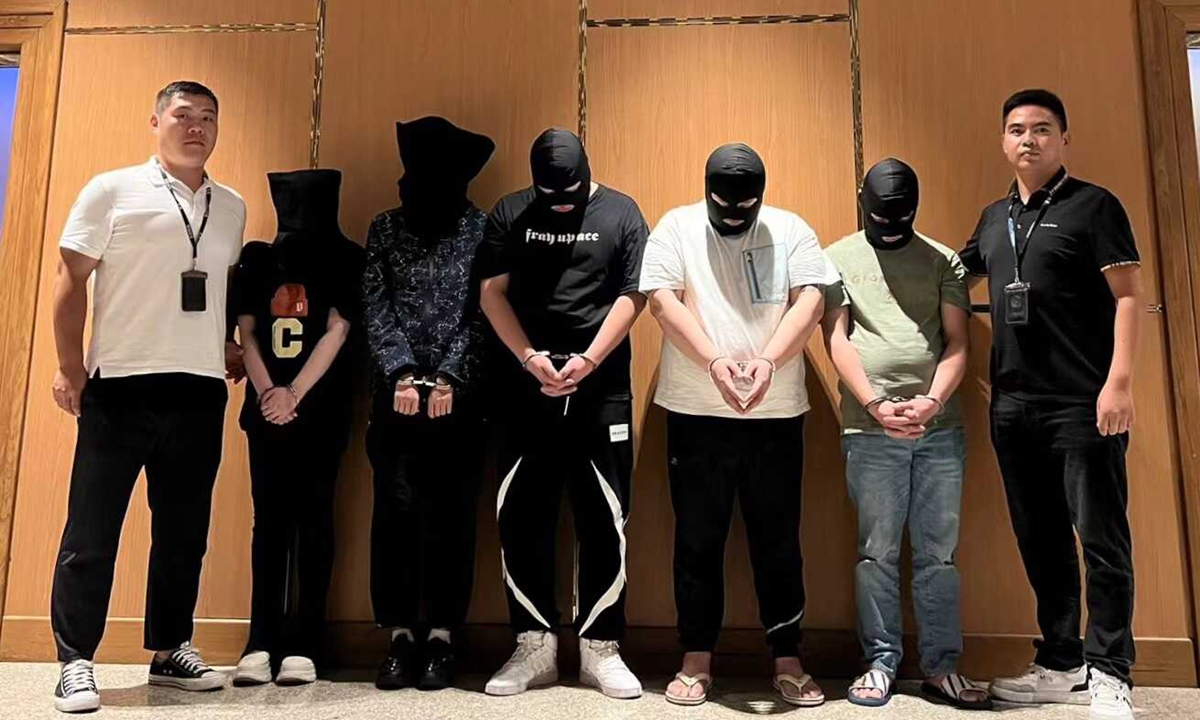
Photo: Chinese Embassy to Myanmar
In just four days, 24 telecom fraud suspects have been brought back from Myanmar to China, said the Chinese Embassy in Myanmar on Saturday, highlighting the determination of a special joint operation launched by China and neighboring countries to crack down on gambling and fraud, which have long been plaguing regional countries.
All parties involved will continue to crack down on gambling crimes in the region with "closer cooperation, more proactive offensive and professional actions," the embassy said in a statement on Saturday.
The move came days after Chen Hai, the Chinese ambassador to Myanmar, released a joint statement on August 22, with his Thai and Laotian counterparts, calling for "stronger coordination" to crack down on scams and "resolutely reverse the high incidence of crimes."
China, Thailand, Myanmar and Laos held a meeting in Thailand's Chiang Mai earlier this month to initiate a special joint operation to crack down on gambling and fraud in the region, as well as human trafficking, kidnapping, illegal detention and other crimes.
The four countries have set up a coordination centre in Chiang Mai for police cooperation in tackling cyber crime gangs, a statement following the meeting said, which came after huge distress and financial harm caused by telecom and online scams to Chinese citizens.
The arrest of the 24 telecom fraud suspects shows the effectiveness made by joint operation, which will serve as a deterrence to potential suspects. Cracking down on overseas criminal activities has been a difficult task in nature as the areas where telecom fraudsters are entrenched have backward economic development, imperfect legal systems and frequent armed conflicts due to political divisions, Zhuang Guotu, head of Xiamen University's Southeast Asian Studies Center, told the Global Times on Sunday.
The long border between China and Southeast Asian countries and the long-standing cultural, economic and trade exchanges make the bilateral exchanges very close, which provides opportunities for criminals to carry out illegal activities to a certain extent, Zhuang noted.
China successfully resolved 464,000 cases related to telecom and network law offenses and crimes last year, with 351 ringleaders and key members of criminal groups arrested. Experts say that about 80 percent of the perpetrators of telecom frauds on Chinese citizens are based abroad. This has made tackling the crimes and recovering losses very hard and costly.
The joint crackdown on telecom fraud will continue as it may not be enough to completely eradicate the root causes of illegal and criminal activities in a short period of time, considering the large scope and number of personnel involved in such criminal activities, Zhuang noted.
In fact, everyone may be a potential victim of telecommunication fraud, said Gao Peng, director of the Integrated Innovation Teaching and Research Center of the People's Police University of China, said that telecommunication fraud has formed a complete system from information trading, implementation and distribution of spoils, even with the assistance of big data analysis and artificial intelligence technology.
Along with rising public awareness of preventing telecom fraud, the Chinese government is strengthening border control and exhorting and warning Chinese nationals who go abroad for illegal activities. In the year of 2021 alone, China's public security authorities persuaded more than 210,000 people to return home from abroad.
China will also maintain close cooperation with neighboring countries to jointly promote economic and social development and the improvement of legal and regulatory systems, so as to nip the seeds of crime in the cradle, experts said.
A high-profile case involving a PhD graduate from the Chinese Academy of Sciences surnamed Zhang has been rescued from a cyber fraud park in Myawaddy, Myanmar has sounded alarms for the rampant telecom fraud cases. Zhang will return to China soon, said his elder brother on August 24.
The case of Zhang being tricked to Myanmar and forced to work 18 hours a day under surveillance only came to light and attracted attention after one of his friends posted a video on social media.
Zhang, a post-doctoral researcher, was scammed to Myawaddy for cyber fraud because of debt problems. "He didn't want to go to Myanmar because he felt it was not safe, but he had no other choice that he has already lost his personal freedom at that time," Zhang's girlfriend told the media
Myanmar, especially places like Myawaddy, became a Mecca for such illegal operations, where a well-developed scam chain was already operating and where new laws permitting foreigners to operate casinos added a gambling aspect to the vice industry.
According to data released by China's Ministry of Public Security, as China strengthens its crackdown on telecom network fraud, a large number of telecom fraudsters have transferred their illegal activities to Southeast Asian countries including the Philippines, Cambodia and Myanmar, especially northern Myanmar, accounting for 68.5 percent of all overseas cases.


